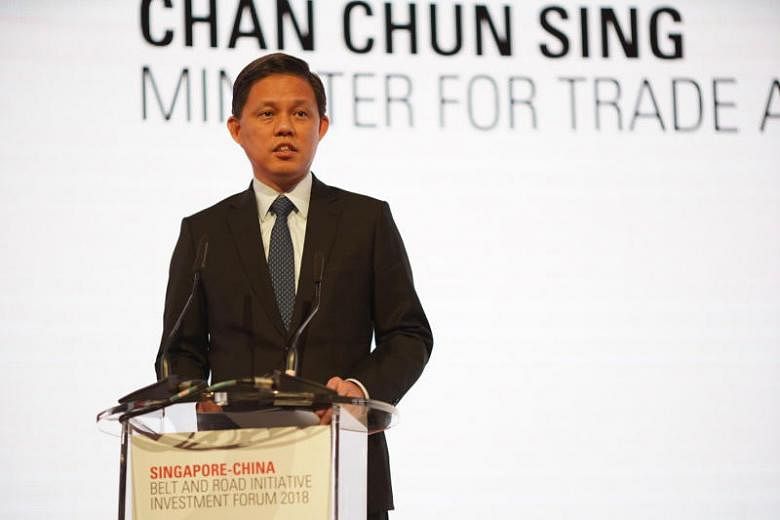SINGAPORE - Countries should work together and update the World Trade Organisation's rules to deal with new issues such as the emergent digital economy, said Trade and Industry Minister Chan Chun Sing on Thursday (Oct 25).
Speaking at the start of a Belt and Road Initiative investment forum held in the The Ritz-Carlton, Millenia Singapore, he stressed the importance of having the multilateral trading system - the foundation on which global trade and investment takes place - move with the times.
This was among four guiding principles that members of the global economy can adopt when navigating global challenges and working together on the Belt and Road Initiative, he said, referring to China's multibillion-dollar plan to connect Asia, Africa and Europe.
Giving an outline of the global situation, he noted that China has shifted from attracting foreign direct investment to increasingly having the ability to export its capital and expertise to the rest of the world.
"Some international media have expressed concerns with this development," he said, adding that others have questioned the intent and financial viability of various projects in China's ambitious plan. "In the global context, we have also seen the rise of anti-globalisation sentiments and the escalation of trade tensions."
"As we mark the fifth year of the Belt and Road Initiative, it is important that we address some of these challenges constructively together, and realise (its) full potential," said Mr Chan.
The first principle he highlighted was strengthening the multilateral system and WTO rules.
Second, there is also a need to allow market discipline to run its course, meaning every project must be evaluated according to market principles. "Projects with the greatest chance of success are those uncoloured by suggestions of non-economic considerations and poor financial management," he said, adding that those held to high standards of financial prudence will also inspire confidence and bring real benefits to the public.
The third principle, he said, is to continue working hard to integrate production and value chains. "Protectionism will result in the fragmentation and isolation of production and value chains," he said. In working towards a more interdependent system, countries must also distribute the nett gains from globalisation across different societies to help those who have fallen behind - or risk local backlash with global consequences.
Four, projects must benefit an expanding circle of stakeholders, from local communities to the region and the world. "By ensuring that there are benefits for all, stakeholders have a vested interest and responsibility in the projects' successes," he said.
Mr Chan then set out how Singapore can play a part in the Belt and Road Initiative as a global trading and financing hub.
One, it can be "a pathfinder for new ideas", he said, citing a connectivity initiative in Chongqing which re-imagines existing trade flows.
"In the past, goods from Western China had to be transported through the Yangtze River before they are exported," he said. "Now, there is the option to travel overland from Western China to Guangxi, and then connect to Southeast Asia via the maritime route."
The China-Singapore (Chongqing) Connectivity Initiative Southern Transport Corridor, he said, has effectively connected the "Belt" of overland corridors with the "Road" of maritime shipping lanes - which were once seen as two separate routes.
"What used to take three weeks can now be achieved in less than one week, at roughly the same cost," he said.
Two, Singapore can serve as a "launch pad" for Chinese companies that want to venture into third-party markets, especially those in Southeast Asia.
Three, the Republic can also offer its expertise in financing and legal advisory services, and enhance the sustainability of projects under the initiative.
"We hope to continuously refine the way we approach infrastructure development, to find new ways to mitigate risks... A robust dispute resolution mechanism will also benefit investors and the host country, given that infrastructure projects are often long-term and capital intensive," he said, pointing out that Singapore can serve as a neutral venue for dispute resolution in Asia.
He concluded by saying that Singapore looks forward to closer partnership with China's National Development and Reform Commission (NDRC), and participating in the second Belt and Road Forum in Beijing next year.
At the opening of the forum on Thursday, Enterprise Singapore chief executive Png Cheong Boon also noted opportunities for collaboration in Southeast Asia, in industrial infrastructure, logistics and the digital space.
He added that for the Belt and Road Initiative to succeed, "there is a need for even more private sector involvements, often working together with one another, in partnership with local governments and collaborating with multi-lateral development banks".
Vice-chairman of the NDRC Ning Jizhe, who also spoke at the event, shared his views on third-party market collaboration, noting the need to find ways to support enterprises and provide policy guidance for them, as well as to respect the will of the third-party countries it works in and pay attention to their financial health - among other issues.


